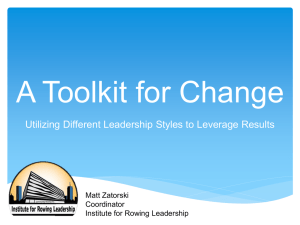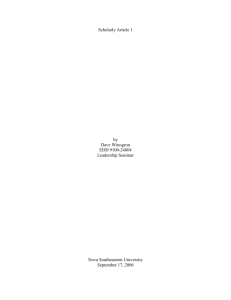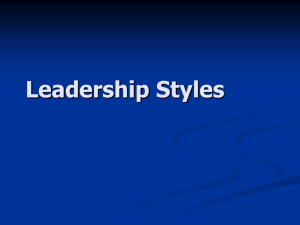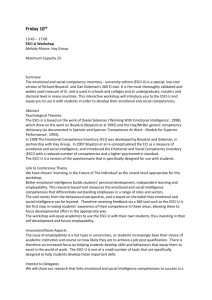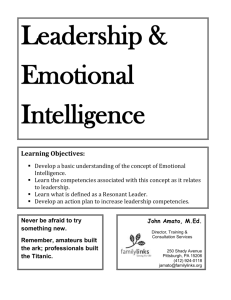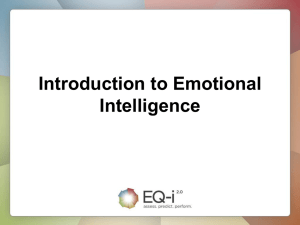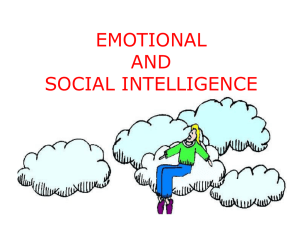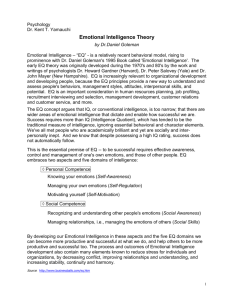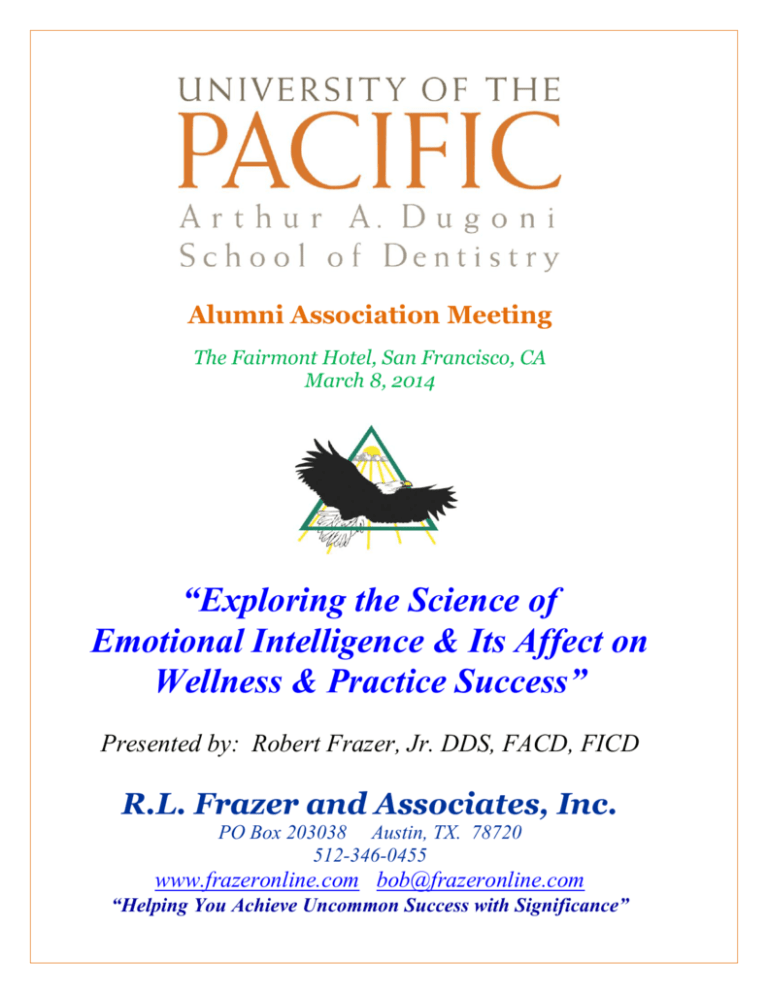
Alumni Association Meeting
The Fairmont Hotel, San Francisco, CA
March 8, 2014
“Exploring the Science of
Emotional Intelligence & Its Affect on
Wellness & Practice Success”
Presented by: Robert Frazer, Jr. DDS, FACD, FICD
R.L. Frazer and Associates, Inc.
PO Box 203038 Austin, TX. 78720
512-346-0455
www.frazeronline.com bob@frazeronline.com
“Helping You Achieve Uncommon Success with Significance”
“Unleashing the Power of Emotional Intelligence”
~ Begin with the end in mind ~
“ACTING ON WHAT YOU LEARNED”
Along the way we suggest you reflect on your insights and discoveries from
this time together, what do you intend to do? Consider the most pressing human
problems in your work &/or life today in answering the following questions. The
likelihood of something being done increases by a factor of five when written down.
Take a few minutes to commit to some changes or enhancements.
1. What were the most meaningful things I discovered/learned?
2. What do I intend to change or do differently as a result of this introduction to EI?
When will I begin?
What resources will I need?
When will I start? ____________ When will action be completed? ____________
What will be my reward(s)?
ALL RIGHTS RESERVED
R. L. Frazer & Associates, Inc.
* PO Box 203038 * Austin, Texas 78720 * 512/346-0455 * Fax 512/346-1071 *
Email - bob@frazeronline.com * Website - www.frazeronline.com
2
How’s Your E.I.? Questions to Answer…
Answer the following by indicating:
1 = Yes
2 = Sometimes
3 = No
Q1. I keep avoiding a difficult conversation………………..
___
Q2. There is an emotional divide between my front office
& clinical team…………………………………………………….
Q3. Too often my day is an emotional rollercoaster……..
___
___
Q4. A member of my family or team is often stressed by
being the emotional center of conflict…………………..
___
Q5. Often it’s difficult for me to identify & verbally express
my feelings………………………......................................
___
Q6. Too often new patients are wary & reluctant, or too
focused on our fee to accept our best dentistry……
___
Q7. When someone feels a strong emotion it makes me
uncomfortable…………………………………………………
___
Q8. Growing up - my parents/primary care givers did not
handle emotions well – especially in conflict ……..
___
Total Score =______
Interpreting Your E.I. Score:
________ – Very High
_______ – High
_______ – Moderate *
_______ - Low *
_______ - Very Low *
* Would truly benefit from E.I. training. Disclaimer: There’s no standardized EI test.
3
Emotional Intelligence is . . .
"Emotional Intelligence is defined as our capacity for
recognizing our own feelings and those of others, for motivating
ourselves, for managing emotions well in ourselves and our
relationships."
Daniel Goleman, “Working With Emotional Intelligence,
Bantam 1998
The Basics of Emotional Intelligence Include:
Knowing your feelings and using them to make life decisions you can
live with.
Being able to manage your emotional life without being
hijacked by it…not being paralyzed by depression or worry, or swept
away by anger.
Persisting in the face of setbacks and channeling your impulses in
order to pursue your goals.
Empathy - reading other people’s emotions without their
having to tell you what they are feeling.
Handling feelings in relationships with skill and harmony being able to articulate the unspoken pulse of a
group, for example.
Remember - Facts tell – while Emotions Sell!
From the October 2002 -Utne Reader ~ Daniel Goleman, Ph.D.
See: webkeeper@utne.com
4
EMOTIONAL COMPETENCIES
Personal Competence
These competencies determine how we manage ourselves
Self - Awareness
Knowing one's internal states, preferences, resources, and intuitions
Emotional awareness: Reading one's own emotions and recognizing
their impact; using "gut sense" to guide decisions
Accurate self-assessment: Knowing one's strengths and limits
Self-confidence: A strong sense of one's strengths and capabilities
Self - Management
Managing one's internal states, impulses, and resources
Emotional Self-Control: Keeping disruptive emotions and impulses
in check.
Transparency: Displaying honesty and integrity; trustworthiness
Adaptability: Flexibility in adapting to changing situations or
overcoming obstacles.
Achievement: The drive to improve performance to meet inner
Standards of excellence.
Initiative: Readiness to act and seize opportunities
Optimism: Seeing the upside in events
Social Competence
These competencies determine how we manage relationships
Social Awareness
Empathy: Sensing others' emotions, understanding their perspective,
and taking active interest in their concerns
Organizational awareness: Reading the currents, decision networks,
and politics at the organizational level
Service: Recognizing and meeting follower, client, or customer needs
Relationship Management
Inspirational leadership: Guiding and motivating with a compelling
Vision.
Influence: Wielding a range of tactics for persuasion
Developing others: Bolstering others' abilities through feedback and
guidance.
Change catalyst: Initiating, managing, and leading in a new direction
Conflict management: Resolving disagreements
Building bonds: Cultivating and maintaining a web of relationships
Teamwork and collaboration: Cooperation and team building.
5
What Happens When Lizard is Out?
Increased impulsivity
Disruption in strategic thinking
Increased general anxiety
Over-focusing on vivid, trivial details
Memory set to recall confirming past events
Actions taken that aren’t fully conscious
How Emotions Occur
Pre-frontal Cortex - Biography
Neural Pathways – A Feeling
Affect - Physiology
The Lizard -Limbic System – Amygdala
Social Intelligence, Mirror Neurons & the Limbic Tango
LEADERSHIP
STYLES
SUMMARY
The consulting firm of Hay-McBer conducted research on 3,871 executives
selected randomly from a database of more than 20,000 executives worldwide to
determine the most effective leadership styles. Their research found six distinct styles,
each springing from different components of emotional intelligence. The styles taken
individually appear to have a direct and unique impact on working atmosphere (climate)
within a company, division or a team and on financial performance.1
6
The most important finding of this research is that the best leaders in terms of
results, use all of these styles each week seamlessly and dependent the situation. For you
to become an exceptional leader, these six styles need to be studied and brought into
your repertoire of leadership styles. Too often we rely primarily on one style, often with
a second fall back style.
The research shows that such leaders do not achieve excellent results. We believe
that these leadership styles are as critical to the success of a dental practice for leading
both your team and your patients as they are for business executives. To effortlessly
access these styles we must have or develop the underlying emotional competencies
The Leadership Styles…
VISIONARY
Leader’s modus operandi: Mobilizes people toward a vision.
Style in a phrase: “Come with me!”
Underlying E.I. Competencies: Self-confidence, empathy & change catalyst
Builds Resonance by: Moving people toward a shared vision.
When Appropriate: When changes require a new vision, or when clear direction is
needed. Overall impact on climate: Most strongly positive
COACHING
Leader’s modus operandi: Develops people for the future.
Style in a phrase: “Try this.”
Underlying E.I. Competencies: Developing others, empathy, service & self-awareness
Builds Resonance by: Connecting what a person wants to the organization’s goals.
When Appropriate: To help an employee improve performance, release potential,
develop long-term strengths.
Overall impact on climate: Positive
AFFILIATIVE
Leader’s modus operandi: Creates harmony & builds emotional bonds.
Style in a phrase: “People come first.”
Underlying E.I. Competencies: Empathy, building bonds, teamwork & collaboration
Builds Resonance by: Creating harmony by connecting people.
When Appropriate: To heal rifts in a team or to motivate people during stressful times.
Overall impact on climate: Positive
7
DEMOCRATIC
Leader’s modus operandi: Forges consensus through participation.
Style in a phrase: “What do you think?”
Underlying E.I. Competencies: Teamwork, collaboration, service & communication
Builds Resonance by: Valuing people’s input & getting commitment through
participation.
When Appropriate: to build buy-in or consensus or to get input from valued
others/employees
Overall impact on climate: Positive
PACESETTING
Leader’s modus operandi: Sets high standards for performance.
Style in a phrase: “Do as I do, now!”
Underlying E.I. Competencies: Conscientiousness, achievement & initiative
Builds Resonance by: Meeting challenging & exciting goals.
When Appropriate: To get high-quality results from a motivated & competent team.
Overall impact on climate: Often highly negative because of poor execution & overuse.
COMMANDING
Leader’s modus operandi: Demands immediate compliance.
Style in a phrase: “Do what I tell you, now!”
Underlying E.I. Competencies: Achievement, initiative & self-confidence
Builds Resonance by: Soothing fears & giving clear directions in an emergency.
When Appropriate: In a crisis, to kick-start a turnaround, or to deal with problem
employee.
Overall impact on climate: Because so often misused, highly negative.
1 Daniel Goleman, Leadership That Gets Results, HBR, March-April 2000, HBR Reprint #R00204
A Critical E.I. Competency is Listening – & there are four ways
to listen with the Most Powerful Type of Listening being –
Active Listening – The listener reflects not only what is said, but especially… the
emotions expressed by the speaker.
8
THE AWARENESS WHEEL
"One moment of true Awareness can change the most
stuck relationships"
~ Ram Dass
Sensory Data -
"I" saw (see) . . . .
"I" heard (hear) . . . .
Interpretation -
"I" interpret . . . .
"My" fantasy about that is..
"I" imagine . . . .
Emotion -
"I feel" . . . angry, sad, glad
etc.
"I" want . . . .
"I" need . . . .
Volition -
From the book Alive and Aware by Miller, Sherod, (New York, Farrar, Straus &
Giroux 1983
A good way to begin –
“I have a problem that I need to speak with you about. Is now a good time?”
Or
“I have a problem with which I need your help. Is now a good time?”
9
BIBLIOGRAPHY
*
*
**
Arrien, Angeles. The Four Fold Way, Harper, 1993
Bennis, Warren. On Becoming a Leader, Addison-Wesley, 1989
Bennis, Warren. Transparency
Block, Peter. Stewardship, Barrett-Koehler, 1993
** Bradshaw, John. Bradshaw On: The Family. Health Communications, 1988
*** Bradshaw, John. Healing the Shame That Binds, Health Communications
Bridges, William. Transitions, Addison-Wesley Publishing
Bridges, William. Managing Transitions, Addison-Wesley Publishing
*** Carlisle, Lynn. In A Spirit of Caring, See website spiritofcaring.com
Collins, Jim. Good To Great, Harper Collins Publisher 2001
Cousins, Norman. Anatomy of an Illness & Human Options, Bantam Books
** Covey, Stephen. The Seven Habits of Highly Effective People. Simon & Schuster
DePree, Max. Leadership is an Art, Dell Publishing Co.
DePree, Max. Leadership Jazz, Dell Publishing Co., 1989
Frankl, Viktor. Man’s Search for Meaning, Pocketbooks, 1963
** Gibran, Kahlil. The Prophet, Knopf Publishing Co., 1923
Ham, O. A. Bud. You Are In The Right Place, White Feather Press, (800)-537-8678
Hamel, Gary. Leading The Revolution, Harvard School Press, hardback - 2000
* Hyken, Shep – The Amazement Revolution, Greenleaf Book Press 2011
** Goleman, Daniel. Working with Emotional Intelligence, Bantam Books 2000
*** Goleman, Daniel. Primal Leadership, Harvard Business School Press, 2002
** Goleman, Daniel. Social Intelligence Bantam 2006
James, Jennifer. Visions From the Heart, Newmarket Press, 1991
** Jampolsky, Gerald. Love is Letting Go of Fear, Celestial Arts
*
Kouzes and Posner. The Leadership Challenge, Jossey-Bass, 2007 – 4th Edition
*
Lockard, William J. DDS The Exceptional Dental Practice bill.lockard@sbcglobal.net 2007
McEwen, William J. Married To The Brand, Gallup Press 2005
McGregor, Douglas. The Professional Manager, McGraw-Hill
Muller, Wayne Sabbath Bantam 1999
*
Pearson, Carol S. The Hero Within, Revised and Expanded, Harper: San Francisco 1998
Peck, M. Scott. The Road Less Traveled, Simon and Schuster, 1978
Pfeiffer, J. William. Shaping Strategic Planning, University Associates
*
Pirsig, Robert. Zen and the Art of Motorcycle Maintenance, Bantam Books
*
Postman & Weingartner. Teaching as Subversive Activity, Dell Publishing Co.
** Powell, John. Why Am I Afraid to Tell You Who I Am?, Argus Communications
*
Prather, Hugh. Notes to Myself, Bantam Books
*
Rackham, Neil. S.P.I.N. Selling Fieldbook, McGraw Hill, 1996
** Rogers, Carl. On Becoming a Person, Houghton Mifflin, (Chapters 3-6-8-17-19)
Sanders, Betsy Fabled Service, Pfeiffer and Company, 1995
Senge, Peter. The Fifth Discipline, Doubleday, 1990
** Siegel, Bernie S. Love Medicine and Miracles, Harper & Row
Simon, Sidney. Meeting Yourself Halfway, Argus Communications, 1974
** Sinek, Simon. Start With Why, Portfolio, 2009
Stanley, Thomas J, The Millionaire Mind, Andrews Mc Neal 2000
Toffler, Alvin. Learning for Tomorrow, Vintage Paperbacks
Treacy & Wiersema. The Discipline of Market Leaders, Addison-Wesley Publishing, 1995
*
Wheatley, Margaret. Leadership and the New Science, Berrett-Koehler Publisher, Inc. 1992-1994
R. L. Frazer & Associates, Inc. * P.O. Box 203038, * Austin, Texas, USA 78720 * Ph - 512/346-0455
Website - www.frazeronline.com
10

